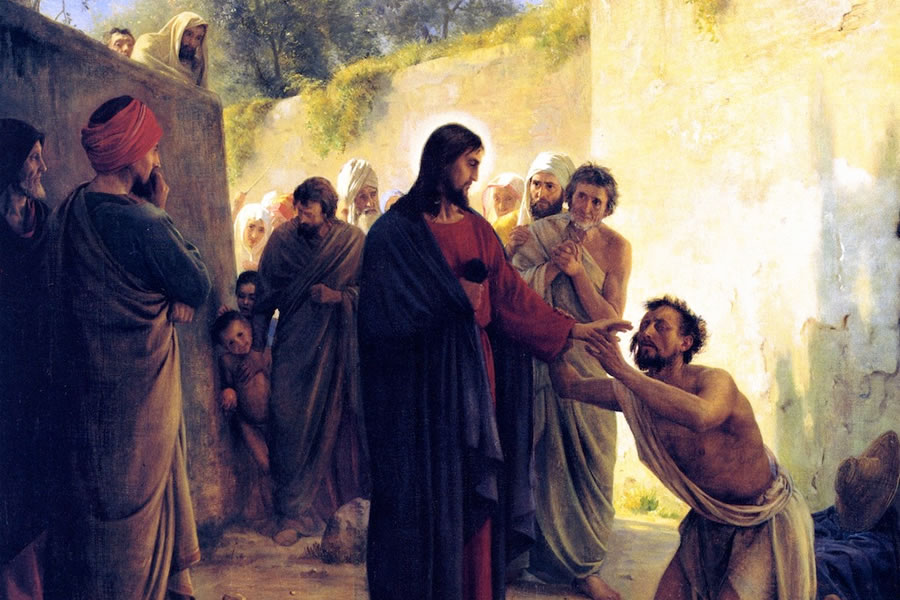St. Francis of Assisi Weekly Reflections

Peaceable, Gentle, Compliant, Full Of Mercy
09-22-2024Weekly ReflectionWe Celebrate Worship Resource, Vol. 49, No. 1Where do the wars and where do the conflicts among you come from?” James asks in the second reading (James 4:1). From jealousy, selfishness, and greed for what we don’t have, he concludes. We see these human passions playing out in today’s other readings. In Wisdom, the wicked ones torture the just one, for he stands in the way of their lawlessness. In the Gospel, while Jesus teaches his disciples that he is to suffer and die, they argue about which of them is the greatest. In both cases, people are thinking of themselves first. Others are only obstacles. We can let ourselves be swayed by the same passions; but instead, to use James’ words, we should be “peaceable, gentle, compliant, full of mercy” (James 3:17). Thee quali es lead us to be other-centered, not self-centered. These are qualities we admire and nurture in children, children like the ones Jesus embraces as an example of being the “last of all” (Mark 9:35). These are the qualities that we need to strive to exercise ourselves.
How do you tamp down jealousy and envy? How can you be more peaceable and merciful?
Pacíficos, Amables, Dociles, Llenos De Misricordia
¿De dónde vienen las guerras y los conflictos entre ustedes?”, pregunta San ago en la segunda lectura (San ago 4:1). De los celos, el egoísmo y la codicia por lo que no tenemos, concluye. Vemos estas pasiones humanas en las otras lecturas de hoy. En la Sabiduría, los malvados torturan al justo, porque se interpone en el camino de su maldad. En el Evangelio, mientras Jesús enseña a sus discípulos que él debe sufrir y morir, ellos discuten sobre quién de ellos es el más grande. En ambos casos, las personas piensan primero en sí mismas. Los demás son solamente obstáculos. Podemos dejarnos llevar por las mismas pasiones; pero en cambio, para usar las palabras de San ago, debemos ser “pacíficos, amables, dóciles, llenos de misericordia” (San ago 3:17). Estas cualidades nos llevan a centrarnos en los demás, no en nosotros mismos. Son cualidades que admiramos y fomentamos en los niños, niños como aquellos a quienes Jesús acoge como ejemplo de ser “los úl mos de todos” (Marcos 9:35). Son cualidades que debemos esforzarnos por ejercitar nosotros mismos.
¿Cómo podemos controlar los celos y la envidia? ¿Cómo podemos ser más pacíficos y misericordiosos?
True Wisdom
09-22-2024Question of the WeekReading I : Wisdom 2:12, 17-20 • The Wicked Speak
Reading II :James 3:16—4:3 • True Wisdom and Worldly Desires
Gospel Mark 9:30-37 • Second Teaching of the Paschal Event and Words Against Ambi on and Envy
Key Passage He sat down, called the twelve, and said to them, “Whoever wants to be first must be last of all and servant of all.” (Mark 9:35)
Adults: What evidence do you see in the world around you that many do not accept Jesus’ teaching on power and ambition?
Kids: Why do you think Jesus says if you want to be first you should take care of others?
La Verdadrea Sabiduria
Lectura I : Sabiduría 2:12, 17-20 • Los malvados hablan Lectura II : San ago 3:16—4:3 • La Verdadera Sabiduría y los Deseos Mundanos Evangelio : Marcos 9:30-37 • Segunda Enseñanza del Acontecimiento Pascual y Palabras contra la Ambición y la Envidia Pasaje Clave : Se sentó, llamó a los doce y les dijo: “El que quiera ser el primero, que sea el úl mo de todos y el servidor de todos” (Marcos 9:35).Adultos: ¿Qué evidencia ven en el mundo que los rodea de que muchos no aceptan la enseñanza de Jesús sobre el poder y la ambición? Niños: ¿Por qué creen que Jesús dice que si queremos ser los primeros debemos cuidar de los demás?
Time, Faith and Works
09-15-2024Question of the WeekReading I : Isaiah 50:4-9a • Salvation Through the Lord’s Servant
Reading II : James 2:14-18 • Faith and Good Works
Gospel : Mark 8:27-35 • First Teaching of the Paschal Event and the Doctrine of the Cross
Key Passage : Faith by itself, if it has no works, is dead. But someone will say, “You have faith and I have works.” Show me your faith apart from your works, and I by my works will show you my faith. (James 2:17–18)
Adults: Why should faith always lead to good works?
Kids: What good works can you do to show your faith in
Jesus?
Tiempo, Fe Y Obras
Lectura I : Isaías 50:4-9a • La salvación por medio del Siervo del Señor
Lectura II : San ago 2:14-18 • La fe y las buenas obras
Evangelio : Marcos 8:27-35 • Primera enseñanza sobre el acontecimiento pascual y la doctrina de la cruz
Niños: ¿Qué buenas obras puedes hacer para demostrar tu fe en Jesús?

The Son of Man Must Suffer Greatly
09-15-2024Weekly ReflectionWe Celebrate Worship Resource, Vol. 49, No. 1When Jesus asks his disciples who they say he is, Peter immediately declares, “You are the Christ” (Mark 8:29), Christ being the Greek translation of the Hebrew Messiah. Poor Peter. He had it right, yet he got it all wrong. Yes, Jesus was the Messiah, but not the Messiah the disciples expected. Jesus sets them straight immediately, teaching them that he was sent to suffer and die. Peter cannot accept this. The disciples had just seen him cure another person and confront the religious authorities. Shouldn’t the Messiah continue doing both, eventually ending all their infirmities and triumphing over their oppressors? Isaiah was closer to seeing things from God’s perspective. People spat in his face, but Isaiah was willing to face the next confrontation because he trusted that God was with him. Jesus tells his disciples that they too must deny themselves, take up their crosses, and follow him. This is our challenge now. Today, as we receive Christ in word and sacrament, we unite with him in carrying our crosses. We will suffer, but our suffering is made holy by his presence.
How can knowing that Christ is with you in your suffering make it easier for you to cope with carrying your cross?
El Hijo Del Hombre Tendrá Que Sufrir Mucho
Quando Jesús les pregunta a sus discípulos quién dicen que es él, Pedro declara inmediatamente: “Tú eres el Cristo” (Marcos 8:29), siendo Cristo la traducción griega del Mesías hebreo. Pobre Pedro. Tenía razón, pero se equivocó. Sí, Jesús era el Mesías, pero no el Mesías que los discípulos esperaban. Jesús los corrige de inmediato, enseñándoles que fue enviado a sufrir y morir. Pedro no puede aceptar esto. Los discípulos acababan de verlo curar a otra persona y enfrentarse a las autoridades religiosas. ¿No debería el Mesías continuar haciendo ambas cosas, terminando finalmente con todas sus enfermedades y triunfando sobre sus opresores? Isaías estaba más cerca de ver las cosas desde la perspec va de Dios. La gente le escupió en la cara, pero Isaías estaba dispuesto a enfrentar la siguiente confrontación porque confiaba en que Dios estaba con él. Jesús les dice a sus discípulos que ellos también deben negarse a sí mismos, tomar sus cruces y seguirlo. Este es nuestro desa o ahora. Hoy, cuando recibimos a Cristo en la palabra y el sacramento, nos unimos a él para llevar nuestras cruces. Sufriremos, pero nuestro sufrimiento se hace santificado por su presencia.
¿Cómo puede el saber que Cristo está con go en tu sufrimiento hacer que sea más fácil para ti sobrellevar tu cruz?

He Makes The Deaf Hear
09-08-2024Weekly ReflectionWe Celebrate Worship Resource, Vol. 49, No. 1Rarely do the evangelists give us the exact words Jesus spoke in Aramaic, but we hear one today: “Ephphatha!” which helpfully translates for his Greek-speaking audience as a command meaning, “Be opened! Jesus says it after touching the ears and tongue of the man with hearing and speech impediments. Note that Jesus did not say, “Listen!” or “Speak!” In saying “Be opened!” he is saying more than that he has cured those faculties. He is telling the man to open himself up to a new world. By keeping the original language, Mark is telling his readers, then and now, to do the same. Are our ears closed to God’s word? “Ephphatha!” Do we keep our mouths closed when we could boldly proclaim the Good News? “Ephphatha!” James gives an example in the second reading, asking if we avoid a poor person with shabby clothes while welcoming someone in fine clothes. Are we listening to what Jesus teaches? What are we proclaiming with our actions if we ignore or mistreat someone based on their outer appearance? James remind us: who did Jesus say would inherit the kingdom of God? May we open our ears, our lips, and our hearts to God’s word made flesh.
How can you listen to God’s word with new ears and proclaim it with a new voice?
Él Hace Oír A Los Sordos
En raras ocasiones los evangelistas nos dan las palabras exactas que Jesús pronunció en arameo, pero hoy escuchamos una: “¡Effatá!”, que se traduce para su audiencia de habla griega como una orden que significa “¡Ábrete!”. Jesús lo dice después de tocar los oídos y la lengua del hombre con impedimentos auditivos y del habla. Nótese que Jesús no dijo “¡Escucha!” o “¡Habla!”. Al decir “¡Ábrete!”, está diciendo más que ha curado esas facultades. Está diciendo al hombre que se abra a un mundo nuevo. Al mantener el idioma original, Marcos está diciendo a sus lectores, entonces y ahora, que hagan lo mismo. ¿Están cerrados nuestros oídos a la palabra de Dios? “¡Effatá!”. ¿Mantenemos nuestras bocas cerradas cuando podríamos proclamar con valentía la Buena Nueva? “¡Effatá!”. Santiago da un ejemplo en la segunda lectura, preguntando si evitamos a una persona pobre con ropa raída mientras damos la bienvenida a alguien con ropa fina. ¿Estamos escuchando lo que Jesús enseña? ¿Qué proclamamos con nuestras acciones si ignoramos o maltratamos a alguien por su apariencia exterior? Santiago nos recuerda: ¿quién dijo Jesús que heredaría el reino de Dios? Abramos nuestros oídos, nuestros labios y nuestros corazones a la palabra de Dios hecha carne.
¿Cómo podemos escuchar la palabra de Dios con oídos nuevos y proclamarla con una voz nueva?
Rich In Faith
09-08-2024Question of the WeekReading I: Isaiah 35:4-7a - Israel’s Deliverance
Reading II: James 2:1-5 - Against Favoritism
Gospel: Mark 7:31-37 - Healing of a Deaf Mute
Key Passage: Listen, my beloved brothers and sisters. Has not God chosen the poor in the world to be rich in faith and to be heirs of the kingdom that he has promised to those who love him? (James 2:5)
Adults: When has your faith in Jesus enabled you to speak out on an issue of importance?
Kids: What does your belief in Jesus mean to you?
Ricos En La Fe
Lectura I: Isaías 35:4-7a - La liberación de Israel
Lectura II: Santiago 2:1-5 - Contra el favoritismo
Evangelio: Marcos 7:31-37 - La sanación de un sordomudo
Pasaje Clave: Escuchen, mis amados hermanos. ¿No ha elegido Dios a los pobres del mundo para que sean ricos en fe y herederos del reino que ha prometido a quienes lo aman? (Santiago 2:5)
Adultos: ¿Cuándo su fe en Jesús les ha permitido hablar sobre un tema de importancia?
Niños: ¿Qué significa para ustedes su fe en Jesús?

Create In Me A Clean Heart, O God
09-01-2024Weekly ReflectionWe Celebrate Worship Resource, Vol. 49, No. 1Many of us wince to see Jesus’ disciples sit down to a meal without washing their hands first. But Mark did not include this vignette in his Gospel to show that Jesus taught bad hygiene. No, Jesus is teaching the difference between God’s commands and human traditions. The religious authorities taught that washing one’s hands before eating was a matter of ritual purity, but that mattered not a whit to Jesus. Recall that in the story of the good Samaritan, the priest and the Levite sinned when they chose safeguarding their ritual purity over assisting the stranger in need. Ritual and tradition are important, certainly, but God’s law is supreme. This is what Moses taught, proclaiming that no human law could be as just or wise as God’s. Jesus adds to this by identifying the human heart, not dirty hands, as the source of the evils that defile. We are to look into our hearts for sins and failings, not judge the actions of others. Let us heed James’ words in the second reading: Caring for those in need can keep us undefiled before God.
What attitude in your heart leads you to sin or prevents you from doing good?
Crea En Mi Un Corazón Puro, Señor
Muchos de nosotros nos estremecemos al ver a los discípulos de Jesús sentarse a comer sin lavarse las manos primero. Pero Marcos no incluyó esta viñeta en su Evangelio para mostrar que Jesús enseñaba una mala higiene. No, Jesús está enseñando la diferencia entre los mandamientos de Dios y las tradiciones humanas. Las autoridades religiosas enseñaban que lavarse las manos antes de comer era una cuestión de pureza ritual, pero eso no le importaba en absoluto a Jesús. Recordemos que en la historia del buen samaritano, el sacerdote y el levita pecaron cuando eligieron salvaguardar su pureza ritual en lugar de ayudar al extraño necesitado. El ritual y la tradición son importantes, sin duda, pero la ley de Dios es suprema. Esto es lo que enseñó Moisés, proclamando que ninguna ley humana podría ser tan justa o sabia como la de Dios. Jesús añade a esto identificando el corazón humano, no las manos sucias, como la fuente de los males que contaminan. Debemos mirar dentro de nuestro corazón en busca de pecados y fallas, no juzgar las acciones de los demás. Prestemos atención a las palabras de Santiago en la segunda lectura: Cuidar a los necesitados puede mantenernos puros ante Dios.
¿Qué actitud de tu corazón te lleva a pecar o te impide hacer el bien?
Doers Of The Word
09-01-2024Question of the WeekReading I: Deuteronomy 4:1-2, 6-8 - Advantages of Fidelity
Reading II: James 1:17-18, 21b-22, 27 - Response to God’s Gift?
Gospel: Mark 7:1-8, 14-15, 21-23 - Jesus and the Pharisees
Key Passage: Welcome with meekness the implanted word that has the power to save your souls. But be doers of the word, and not merely hearers who deceive themselves. (James 1:21–22)
Adults: Which words of Jesus provide the most inspiration for the Christian work that you do?
Kids: How do you welcome the words of Jesus into your heart?
Hacedores De La Palabra
Lectura I: Deuteronomio 4:1-2, 6-8 - Ventajas de la fidelidad
Lectura II: Santiago 1:17-18, 21b-22, 27 - Respuesta al don de Dios
Evangelio: Marcos 7:1-8, 14-15, 21-23 - Jesús y los fariseos
Pasaje Clave: Acepten dócilmente la palabra que ha sido sembrada en ustedes y es capaz de salvarlos. Pongan en práctica esa palabra y no se limiten a escucharla, engañándose a ustedes mismos. (Santiago 1:21–22)
Adultos: ¿Qué palabras de Jesús son las que más inspiran el trabajo cristiano que realizáis?
Niños: ¿Cómo acogéis las palabras de Jesús en vuestro corazón?